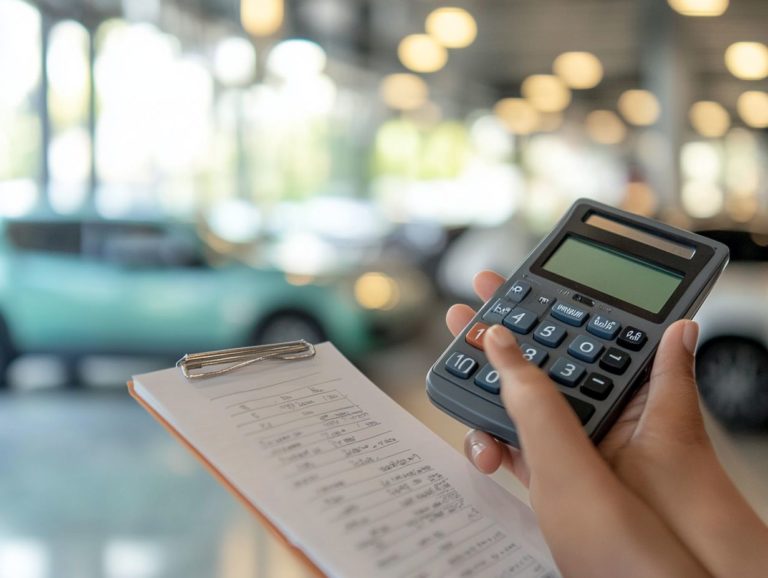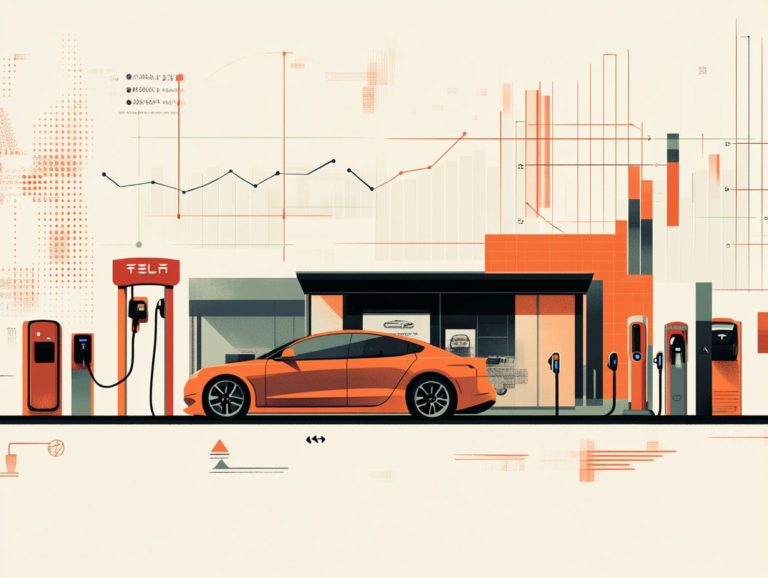Understanding the True Cost of a New Car
Buying a new car is an exhilarating milestone, but it’s vital to look beyond just the sticker price!
Many factors influence the initial cost, ranging from the make and model to current market demand. However, the expenses don t stop there. Insurance, maintenance, and fuel can accumulate faster than you might expect.
Understanding depreciation is essential. After all, your vehicle s value will decrease over time. Exploring alternatives like used cars can also be a smart way to save.
With a few negotiation strategies in your toolkit and a clear understanding of long-term expenses, you ll be in a much stronger position for this significant investment. Delve into the details to make a decision that perfectly aligns with your budget and lifestyle.
Contents
- Key Takeaways:
- The Initial Cost of a New Car
- Additional Expenses to Consider
- The Depreciation of a New Car
- Alternatives to Buying a New Car
- Tips for Negotiating a Better Price
- Considering Long-Term Costs
- Frequently Asked Questions
- What factors should I consider when calculating the true cost of a new car?
- Is the sticker price the only cost I need to worry about when buying a new car?
- How can I estimate the cost of financing a new car?
- How much should you expect to pay for car insurance on a new vehicle?
- Should I factor in depreciation when considering the true cost of a new car?
- How can I save money on the true cost of a new car?
Key Takeaways:
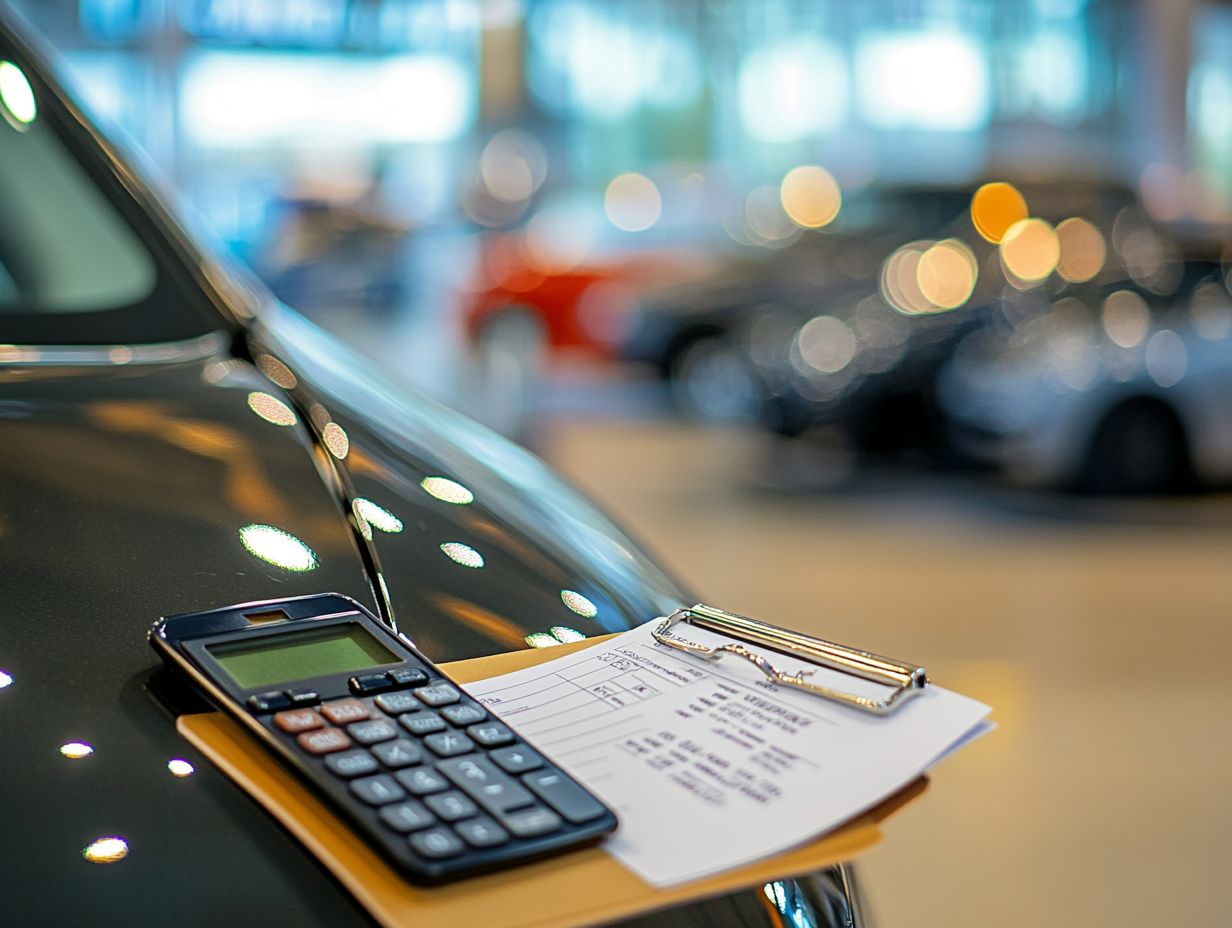
Remember: the sticker price is just the beginning! Think about insurance, maintenance, and fuel when calculating the true cost of owning your car.
Understanding the depreciation of a new car is crucial in determining its true cost. The value of a car decreases over time and should be factored in when making a purchase.
Exploring alternatives to buying a new car, such as used or certified pre-owned options, can help save money in the long run. Negotiating a better price and considering long-term costs can also lead to significant savings.
The Initial Cost of a New Car
The initial cost of a new car involves many factors that can greatly influence your car ownership experience. You ll need to consider the vehicle’s base price, taxes, fees, and any optional add-ons that may catch your eye.
According to the U.S. Bureau of Labor Statistics, the average expenses associated with purchasing a car can vary significantly depending on the make and model be it a sedan, SUV, or electric vehicle. Your budget plays a crucial role in shaping the overall cost of vehicle ownership, taking into account ways to pay for your car and the potential for leasing.
Factors that Determine the Price
Several crucial factors influence the pricing of a new car, including vehicle categories like sedans, SUVs, and electric vehicles, as well as expenses like insurance costs and maintenance costs.
Understanding the distinctions between these categories gives you the power to make more informed purchasing decisions, as each type carries its own unique financial implications. For instance, sedans usually come with lower insurance rates compared to larger SUVs, which tend to attract higher premiums due to their increased value and repair costs.
Maintenance expenses can also vary dramatically. SUVs may require more expensive repairs because of their complex mechanical systems, while electric vehicles often enjoy reduced maintenance needs. Fuel costs play a critical role too, as smaller cars generally offer better mileage.
It’s essential to keep long-term factors like depreciation in mind, as this significantly affects overall ownership costs and can vary widely across different vehicle types.
Additional Expenses to Consider
When you’re budgeting for a new car, it’s crucial to look beyond just the purchase price. Consider the additional expenses that come into play, such as maintenance costs, insurance premiums, and fuel expenses.
These factors significantly contribute to your annual car ownership costs, shaping your overall financial picture.
Insurance, Maintenance, and Fuel Costs
Insurance, maintenance, and fuel are significant ongoing expenses that you must manage to ensure your vehicle remains reliable and performs at its best. Understanding the intricacies of these costs is essential for anyone aiming to budget effectively for car ownership.
Insurance premiums can vary widely, influenced by factors such as your age, driving record, and the type of vehicle you drive. Meanwhile, regular maintenance schedules typically encompass oil changes, tire rotations, and brake inspections, all of which can accumulate over time.
Fuel costs, too, are subject to fluctuations based on current gas prices and your vehicle s fuel efficiency. To alleviate these financial pressures, you might explore alternatives like public transportation or carpooling with friends and colleagues for your daily commutes, ultimately fostering a more economical approach to your travel needs.
Now that you know what to look for, take charge of your car-buying journey today!
The Depreciation of a New Car
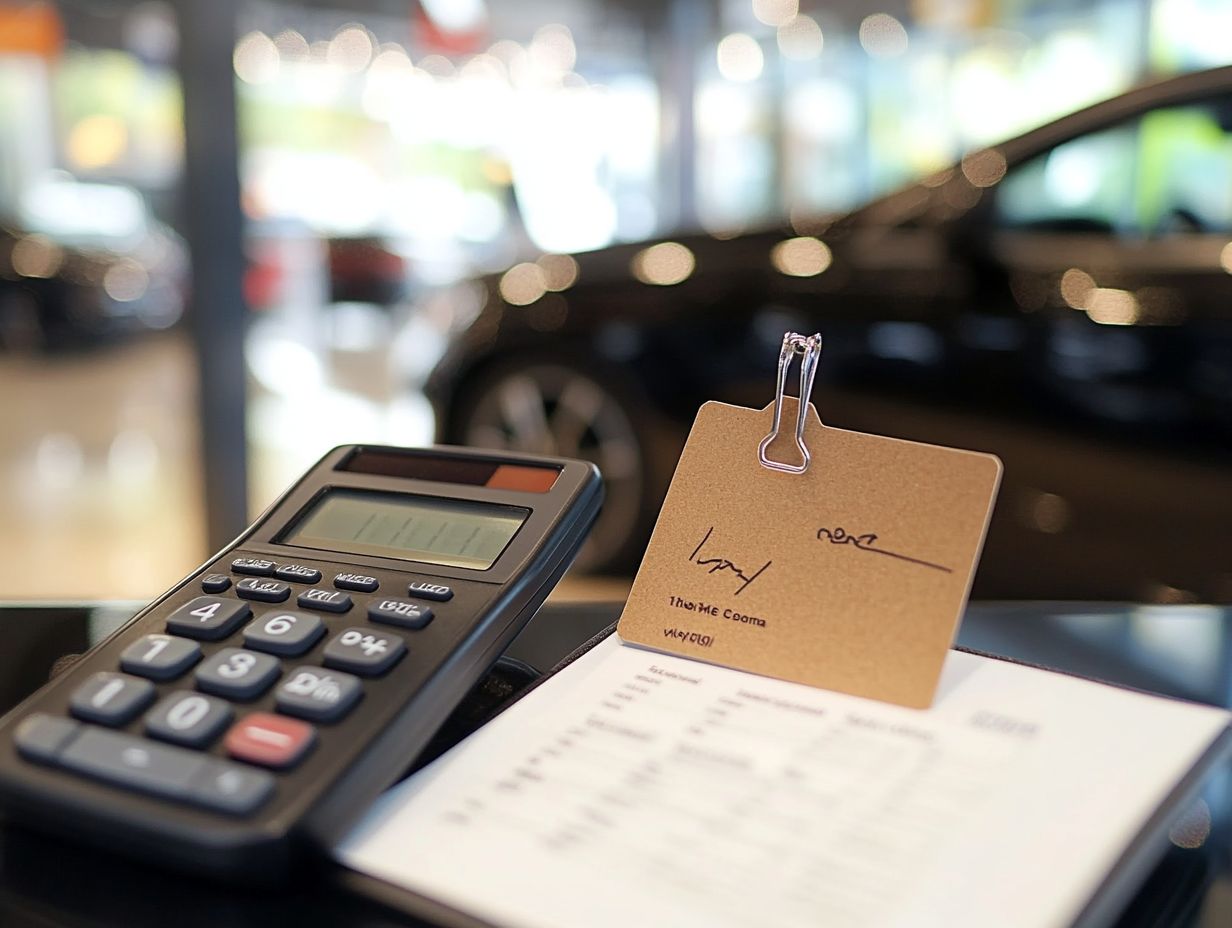
Understanding a new car’s depreciation is crucial for buyers. It influences your total ownership cost and future resale value.
Understanding the Value Loss Over Time
The loss of value in a new car comes from depreciation rates. These rates vary by vehicle type, such as sedans, SUVs, and electric cars.
A sedan usually depreciates by about 15-20% in its first year. SUVs typically hold value better, depreciating around 10-15%.
Electric vehicles face unique challenges due to fast-paced technology. They can lose up to 25% of their value in the first year.
On average, cars lose about 60% of their original value in five years. This impacts owners’ decisions about buying, holding, or selling their vehicles.
Alternatives to Buying a New Car
Considering alternatives to new cars can save you money. Options like used vehicles, certified pre-owned cars, or leasing can offer financial benefits.
Exploring Used and Certified Pre-Owned Options
Choosing used and certified pre-owned vehicles is a smart choice. You can save on initial costs while enjoying reliable ownership.
These options often come with financing plans that simplify the purchasing process. Many certified programs offer warranties similar to those of new cars. This ensures repairs are covered without straining your finances.
Plus, the maintenance costs for these vehicles are generally lower. Their depreciation has already taken place, making them a smarter investment.
You can also explore flexible financing options, including loans with competitive interest rates. This can further enhance affordability and turn your dream of owning a dependable car into a reality.
Tips for Negotiating a Better Price
Negotiating a better price when buying a car can lead to significant savings. Effective strategies help you cut both purchase and hidden costs.
Strategies for Saving Money on a New Car Purchase
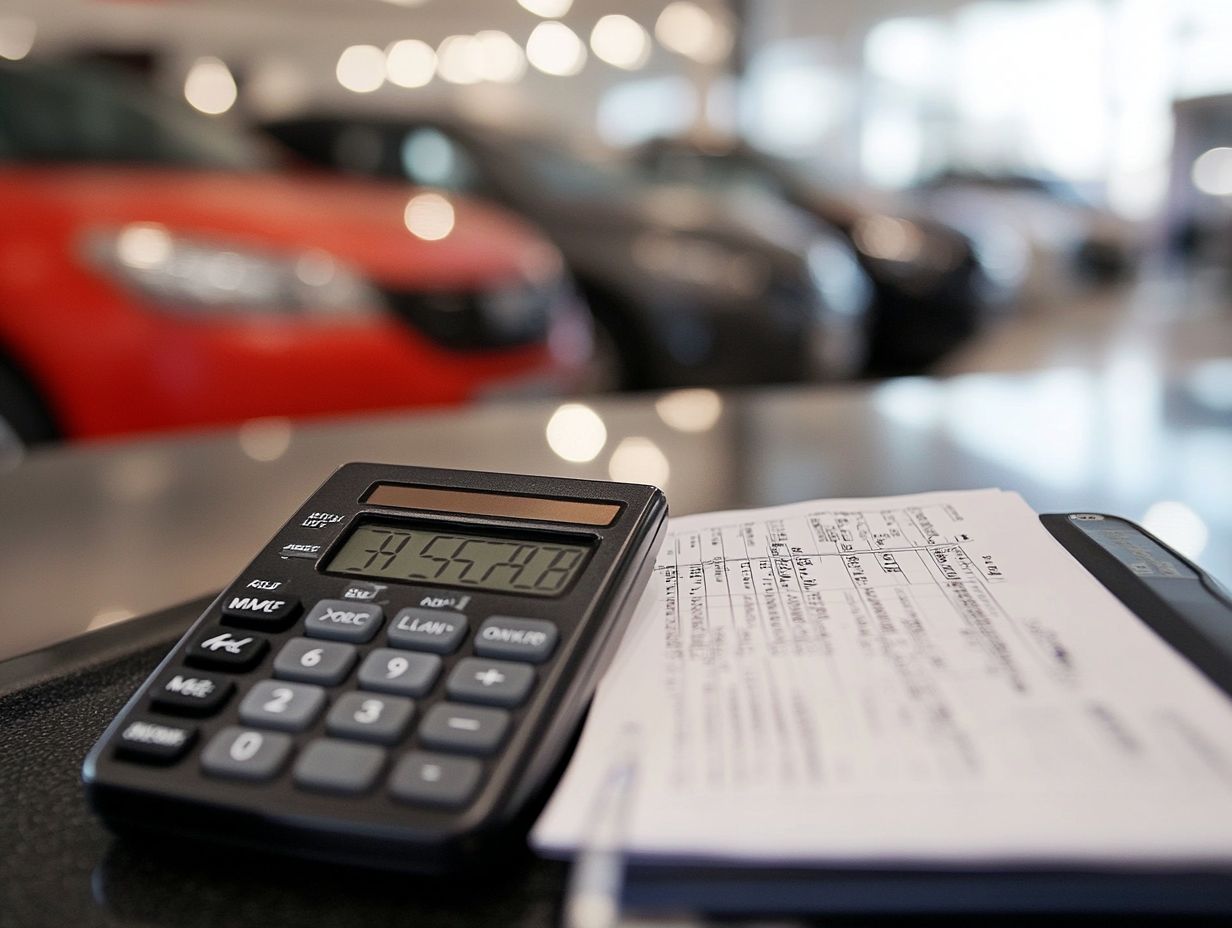
Implementing smart strategies for saving money can greatly reduce your costs. Consider negotiating financing options and checking insurance premiums.
Comparing financing options can reveal better rates. This may save you hundreds over the loan’s life.
Shopping around for insurance helps identify the best premium while revealing applicable discounts, greatly reducing ongoing costs.
Understanding long-term maintenance expenses associated with different makes and models will guide you toward vehicles that offer greater reliability and fewer repairs.
When you combine these strategies, you create a comprehensive approach to reducing overall ownership expenses. This allows you to budget more effectively and enjoy your new vehicle without the burden of financial stress.
Considering Long-Term Costs
Evaluating long-term ownership costs is vital for informed decisions. Expenses can quickly add up, affecting your overall budget.
Taking the time to evaluate these costs empowers you to make wise financial choices!
Projected Expenses over the Lifetime of a New Car
Projected expenses over the lifetime of your new car involve several key factors, including vehicle maintenance, fuel costs, and insurance premiums. Each of these elements plays a crucial role in shaping your overall budget.
Understanding these costs is vital for anyone thinking about car ownership. They can accumulate quickly and lead to unexpected financial challenges. Get ready to take control of your budget!
For example, the average car owner spends around $1,200 each year on maintenance, covering both routine services and unforeseen repairs. Fuel expenses vary significantly, but many drivers spend about $1,500 to $2,000 annually, influenced by fluctuating fuel prices and personal driving habits.
Insurance premiums typically average around $1,000. This can greatly impact your total cost of ownership. Don t let unexpected costs catch you off guard be prepared!
Frequently Asked Questions
What factors should I consider when calculating the true cost of a new car?
When calculating the true cost of a new car, consider the vehicle’s price, taxes, financing options (like loans or leasing), insurance rates, maintenance and repair costs, and fuel efficiency.
Is the sticker price the only cost I need to worry about when buying a new car?
The sticker price isn’t the only cost to consider. There are other costs like sales tax, dealer fees, and add-ons such as extended warranties and maintenance plans.
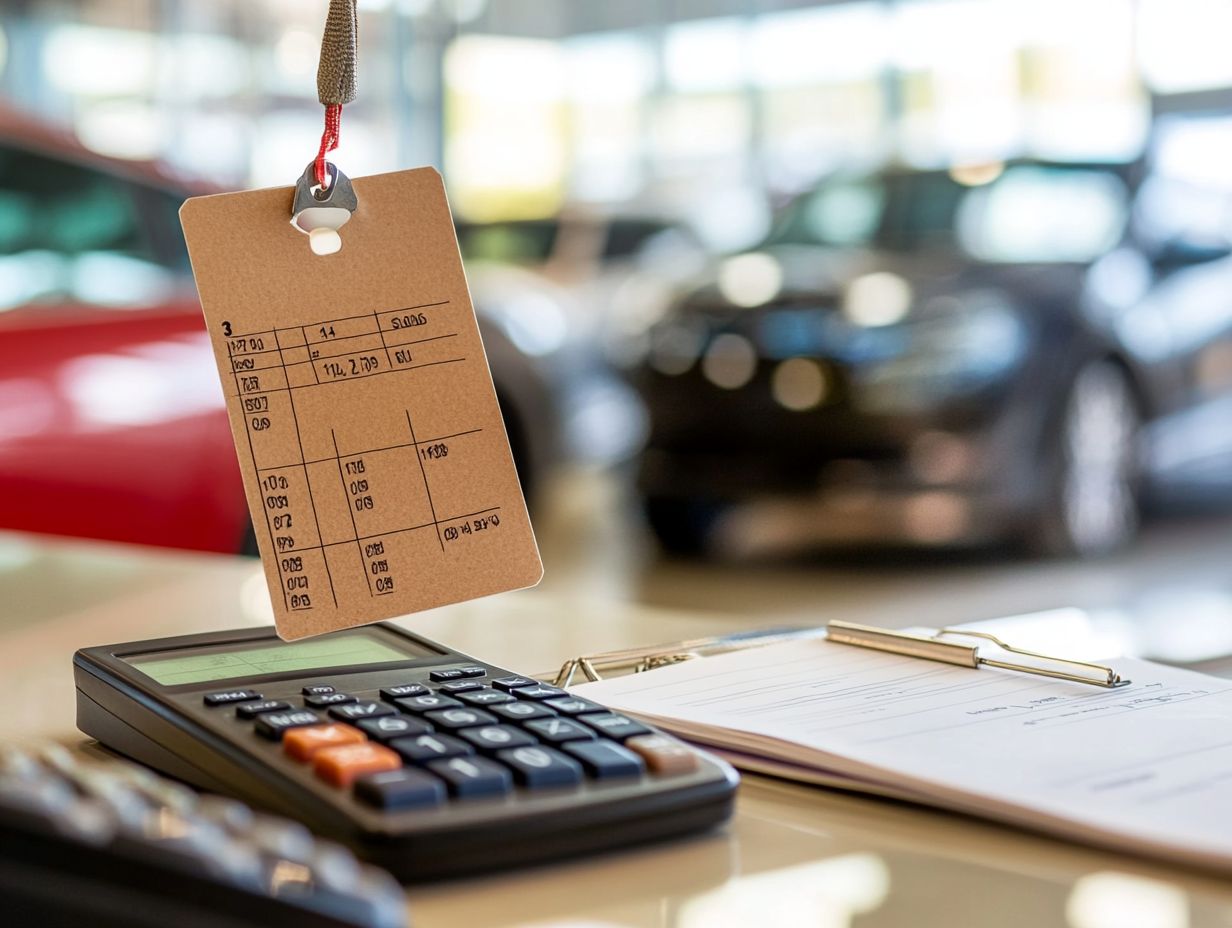
How can I estimate the cost of financing a new car?
You can estimate the cost of financing a new car by using an online loan calculator. Enter the vehicle’s price, your desired down payment, interest rate, and loan term to get an estimate of your monthly payments and total interest paid.
How much should you expect to pay for car insurance on a new vehicle?
The average cost of car insurance for a new car varies based on factors such as your age, driving history, location, and the type of car you are insuring. It is important to shop around and compare quotes from different insurance companies to find the best rate.
Should I factor in depreciation when considering the true cost of a new car?
Yes, depreciation is an important factor to consider when calculating the true cost of a new car. New cars can lose up to 20% of their value in the first year, so it s essential to factor this in when deciding on a budget and financing options.
How can I save money on the true cost of a new car?
To save money on the true cost of a new car, negotiate the price with the dealer, shop around for the best loan rates and insurance quotes, and consider purchasing a slightly used car instead of a brand new one. Start shopping smart today and watch your savings grow!

